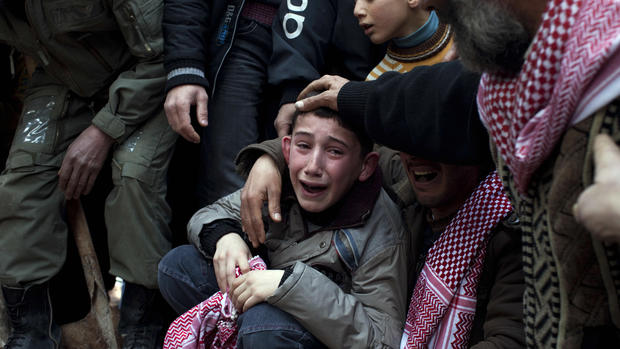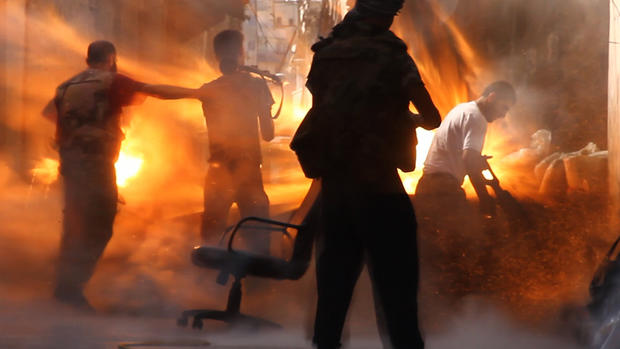Syria opposition coalition tries to get past divisions, form interim government
Updated at 10:55 a.m. Eastern
ISTANBUL, Turkey Syria's main opposition coalition began a push Monday to form an interim government to provide services to people living in parts of the country now controlled by rebel forces.
The effort is the most serious yet by the forces opposing President Bashar Assad to establish a rival administration and bring together all the factions fighting Assad's forces on the ground.
At the start of the conference Monday, there was no guarantee it would succeed. Two previous attempts to form an interim government failed because of divisions within the coalition, and some members said before the meeting Monday that it was unclear if they would agree this time.
- High-ranking Syrian general defects
- Syrian rebel leader confronted with video of his men killing prisoners
- Complete coverage: After the Arab Spring
But many said that this time, there is a new sense within the opposition that unification is necessary, as government retreats have expanded the size of the rebel-held zone that now encompasses much of Syria's largest city Aleppo and one provincial capital, Raqqa.
Currently, local rebel garrisons or community councils run villages and neighborhoods for practical purposes, with limited cooperation between them. Many communities have little electricity and no running water.
Gen. Salim Idris, the head of the opposition Supreme Military Council, told CBS News correspondent Holly Williams on the sidelines of Monday's summit that the formation of an interim government would be "a very important step," and he hoped it would be announced quickly.
"We need this government as soon as possible to support people in the liberated areas," he told Williams, "to support us in our fight against the dictatorial regime in Damascus."
"What delayed this before was that there was no agreement on the importance of forming a government," said Burhan Ghalioun, coalition member and former head of its predecessor, the Syrian National Council. "Now people are convinced that a government is necessary."
Still unclear, reports Williams, is where a new interim government would actually be based. As previous opposition groups based in exile have been plagued by the perception that their countrymen are fighting and dying inside Syria while they live comfortably out of the reach of Assad's weapons, there is pressure for any new administration to find a home inside Syria.
The logistics of that prospect are daunting, however. Assad's regime has shown no reluctance to use its most advanced weaponry, including fighter jets, to target opposition locations, and the president still has loyalists and spies even in cities held largely by the rebels.
Another candidate, Salim Al Muslit, Vice President of the Assistance Coordination Unit, which works to distribute aid, acknowledged to CBS News on Monday that it would be a "dangerous job," but added that, "people have given their lives for the freedom of Syria. What's the difference between them and us? I believe it's important to be close to the people, and be among them."
Two years after the anti-Assad uprising began, the conflict has become a civil war, with hundreds of rebel group fighting Assad's forces across Syrian and millions of people pushed from their homes by the violence. The U.N. says more than 70,000 people have been killed.
International diplomacy has failed to stop the bloodshed, and calls for a negotiated solution have gone nowhere.
In a stance that could frustrate their Western backers, including the United States, coalition members dismiss any possibility of negotiating with the current regime and insist they will talk only when Assad has left power. Many believe the only way to accomplish this is through continued advances by rebel forces.
"There has to be a military victory on the ground to convince the regime, or some elements in the regime," of the need for change, Ghalioun said. "The solution is not an end to the violence. This is linked to pushing the regime toward steps to a democratic system."
Al Muslit, the candidate who spoke to CBS News on Monday, urged the U.S. government to provide more help, and chastised the Obama administration for not doing more already.
"The same dream they have there (Americans), we have here," he told Williams. "I remind you of Martin Luther King when he said 'I have a dream.' Also Syrian children have a dream, and we want this dream to come true. We don't want our children to be massacred and killed in cold blood."
"We want the West to help us and give us arms -- not to kill each other but to get rid of this slaughterer in Damascus," he added. "I believe they can do it, and they could have done it the first minute this revolution started in Syria."
Twelve candidates have been nominated for Prime Minster, who will be elected by the coalition's 73 members. The vote is expected by Tuesday.
Williams reports that some of the candidates are from professional and business backgrounds, and few currently live in Syria or have extensive political experience.
One of the leading candidates is Ghassan Hitto, an IT manager who spent decades living in Dallas, Texas, before moving to Turkey recently. His son Obaida is fighting alongside the rebels inside Syria.
It remained unclear Monday exactly when the vote would take place and who the final candidates would be. Some coalition members suggested that if they could not agree, they could form an executive commission.

